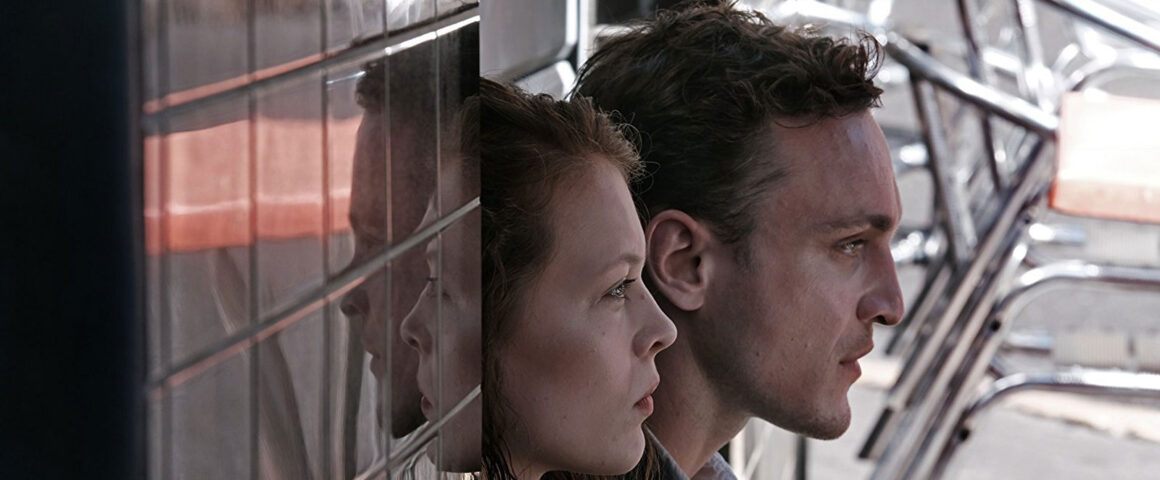“I feel wherever I go, that tomorrow is near, tomorrow is here, and always too soon” — Speak Low, Kurt Weill and Ogden Nash
Georg (Franz Rogowski, “Tiger Girl”), a Jewish radio and TV technician fleeing from persecution in Germany en route to Marseilles, waits in a dimly lit café in Paris for a friend to show up. There is little atmosphere, no Rick or Sam to “play it again.” When the friend arrives, the two men speak in muted tones about things associated with war: Occupation, forged documents, deportations, and the like. Though the word Nazi is never heard, we hear the blaring sound of police sirens moving up and down the streets while armed policeman wearing black suits and helmets stop people demanding to see their papers. So-called “illegals” are rounded up and rumors circulate that a “cleansing” will soon take place.
Based on the 1944 novel of the same name by German author Anna Seghers that mirrored her own experience escaping from the Nazis, all of the indicators in Christian Petzold’s absorbing and emotionally authentic Transit persuade us that we are witnessing a drama set in World War II. When the film conflates the timeline to depict a modern day environment in Marseilles, France, however, we are deposited in a bewildering no-man’s land of thwarted expectations. Buildings and dress are contemporary, yet transportation is limited to trains and ships, there are no hand-held communications devices, and transit visas are necessary to pass through certain countries. In the vernacular, the film is neither here nor there.
As narrated by an unidentified third party (Matthias Brandt, “Killing Stella”), when Georg is asked to deliver two letters to a writer secretly holed up in a nearby hotel, he discovers that the writer, a communist author named Weidel, has committed suicide by slashing his wrists. Ransacking through Weidel’s possessions, he finds the author’s German passport, the manuscript of a novel, two letters from his wife Marie, and a document offering a visa and safe passage to Mexico. Intending to bring the materials to Weidel’s wife, Georg smuggles a dying man (Grégoire Monsaingeon, “K.O.”) aboard a train headed to Marseilles, jumping off at his destination and leaving the dead man’s body for others to discover. A modern Marseilles then becomes the film’s focal point, a necessary destination for those coming and going and those trapped somewhere in between.
When Georg checks into a hotel, he is required to pay for a week in advance and is told incongruously that he must offer proof that he can leave or he will be considered an illegal. After he settles in, he visits the American consulate to obtain a visa to leave France which he believes will soon be occupied by unnamed forces. When the articulate but slyly suspicious consular official (Trystan Pütter, “Anonymous”) assumes that Georg is the writer Weidel, he makes no effort to persuade him otherwise and willingly takes the boat ticket to Mexico that had been assigned to the man he is impersonating. In a Kafkaesque turn of events, Georg keeps bumping into Weidel’s wife Marie (Paula Beer, “Franz”), the mysterious woman whose blue jacket and red blouse evokes the sultry Nina Hoss, one of Petzold’s regulars.
In this hall of mirrors, Marie, unaware that her husband is dead, falls for Georg, the man who is impersonating him. Georg also becomes involved with the mute wife of the deceased man he brought back to Marseilles, and gets to know her young son Driss (Lilien Batman) whom he instructs in some soccer moves, takes him to a seaside playground, impresses him by repairing his broken radio, and sings him a poignant song from his childhood. It is all the more heartbreaking for Driss when Georg tells him he is going to leave for Mexico. Transit is a supercharged drama of human emotions and one of the best films of the year.
Rogowski, considered one of German’s most “in-demand” actors, has an understated but powerful screen presence and is described by Petzold as a “great actor” who is able to balance “sadness and confidence, coldness and empathy” like “a dancer.” Though Transit is without an overt political agenda, its comparison between the fascist world of the 1930s and 40s and today’s anti-immigrant sentiment and the rise of neo-Nazism cannot be mistaken. Petzold creates the maddening reality of a world where past, present, and future blend into one, a netherworld described in author Samuel Beckett’s “Molloy” as being “without memory of morning or hope of night.” While being “in transit” normally refers to the shipping status of an item one has recently purchased, in Petzold’s universe, it is also the absence of belonging or, as in the Talking Heads’ song played over the film’s end credits, being on “the road to nowhere.”




'Movie Review: Transit (2018)' has no comments